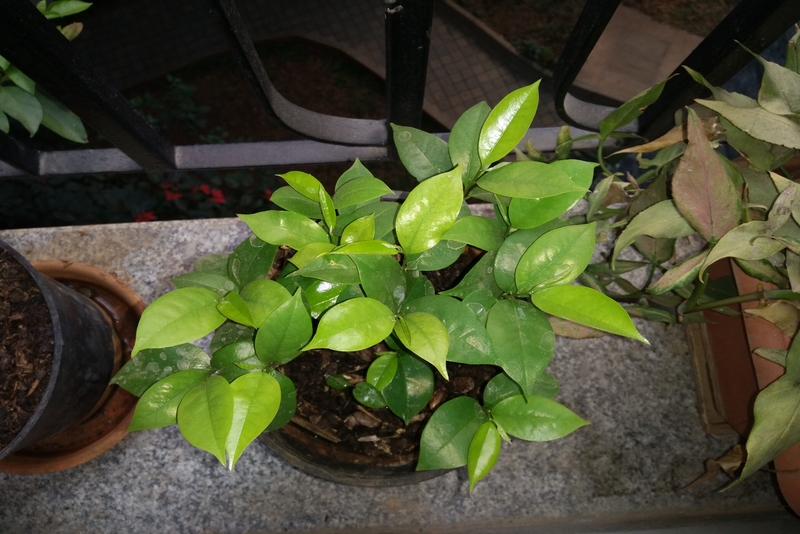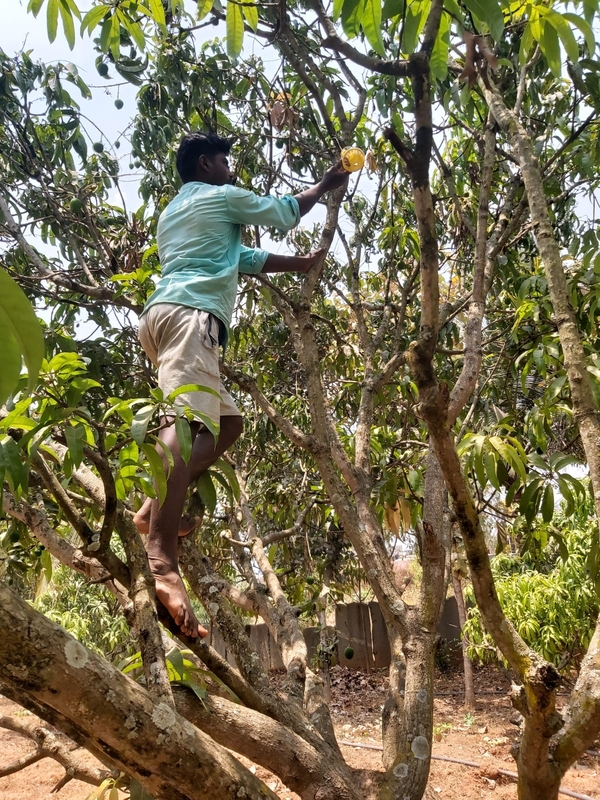Exotic Soursop fruit, Bangalore, India

As kids there was this lean and fairly tall tree that grew in the front garden here in Hayes Road. High up in the branches it gave a prickly looking fruit which my Grandmum, my Dad's mother, knew I loved and saved for me when we visited Bangalore.
They were called Soursops and most homes in Bangalore had a tree. I particularly loved the fruit as it has a sweet sour flavour. The tree fell in a storm and that was the end of the fruit for me.
Many years later when I traveled frequently to the Far East on conferences to Jakarta, Bali and most often to Bangkok I got to enjoy the fruit once again. All the five star hotels we lived in served a whole table of fruit for breakfast and that's when I rejigged my memory of the fruit, albeit as a smoothie now and not scooping it out to eat.
For years I scanned every nursery in Bangalore and Goa for a sapling with no luck at all. Then our caretaker on the farm brought me a Soursop fruit from a nearby farm. After making a smoothie of the pulp for the family I decided to plant the seeds in some compost from our pit. The compost is excellent as it’s pure and is just clean decomposed vegetarian kitchen waste. Far superior to the bought stuff.
I sank the seeds into a pot of compost and left on my travels for three months. Imagine my delight when I returned to find almost all the seeds had germinated as can be seen in the picture. My excitement knew no bounds and after transplanting them into single pots to let them strengthen and grow I will put them down in the farm and grow an orchard of them.
The Soursop the fruit of Annona muricata, a broadleaf, flowering,evergreen tree. The exact origin is unknown; it is native to the tropical regions of the Americas and the Caribbean and is widely propagated.
Then came the age where the fruit is being widely promoted as an alternative cancer treatment, but there is no definitive medical evidence that it is effective for treating cancer or any disease.
Practitioners of herbal medicine use soursop fruit and graviola tree leaves to treat stomach ailments, fever, parasitic infections, hypertension and rheumatism. It's used as a sedative, as well. But claims of the fruit's anti-cancer properties have attracted the most attention and the fruit is being sold for as much as Rs 450/- a kg in Bangalore.
To enjoy a soursop fruit, peel away the tough outer skin and remove the toxic inner seeds. Use the interior pulp as a base for smoothies, milkshakes, and other chilled drinks. You can also roast large sections of the pulp or eat it raw in cubes. The seeds can be planted in some compost and little seedlings will germinate in a few weeks.
The soursop has an aroma similar to pineapple, the flavor of the fruit has been described as a combination of strawberries and apple with sour citrus flavor notes, contrasting with an underlying thick creamy texture reminiscent of banana. Soursop fruit, with its sweet flesh and distinctive flavor, is grown commercially to make juice, candy, sorbet and ice cream.
Experts warn against using the soursop fruit to treat cancer. While research suggests soursop can fight cancer, it has not been studied in humans. As a result, there is no evidence of its safety or efficacy.
They were called Soursops and most homes in Bangalore had a tree. I particularly loved the fruit as it has a sweet sour flavour. The tree fell in a storm and that was the end of the fruit for me.
Many years later when I traveled frequently to the Far East on conferences to Jakarta, Bali and most often to Bangkok I got to enjoy the fruit once again. All the five star hotels we lived in served a whole table of fruit for breakfast and that's when I rejigged my memory of the fruit, albeit as a smoothie now and not scooping it out to eat.
For years I scanned every nursery in Bangalore and Goa for a sapling with no luck at all. Then our caretaker on the farm brought me a Soursop fruit from a nearby farm. After making a smoothie of the pulp for the family I decided to plant the seeds in some compost from our pit. The compost is excellent as it’s pure and is just clean decomposed vegetarian kitchen waste. Far superior to the bought stuff.
I sank the seeds into a pot of compost and left on my travels for three months. Imagine my delight when I returned to find almost all the seeds had germinated as can be seen in the picture. My excitement knew no bounds and after transplanting them into single pots to let them strengthen and grow I will put them down in the farm and grow an orchard of them.
The Soursop the fruit of Annona muricata, a broadleaf, flowering,evergreen tree. The exact origin is unknown; it is native to the tropical regions of the Americas and the Caribbean and is widely propagated.
Then came the age where the fruit is being widely promoted as an alternative cancer treatment, but there is no definitive medical evidence that it is effective for treating cancer or any disease.
Practitioners of herbal medicine use soursop fruit and graviola tree leaves to treat stomach ailments, fever, parasitic infections, hypertension and rheumatism. It's used as a sedative, as well. But claims of the fruit's anti-cancer properties have attracted the most attention and the fruit is being sold for as much as Rs 450/- a kg in Bangalore.
To enjoy a soursop fruit, peel away the tough outer skin and remove the toxic inner seeds. Use the interior pulp as a base for smoothies, milkshakes, and other chilled drinks. You can also roast large sections of the pulp or eat it raw in cubes. The seeds can be planted in some compost and little seedlings will germinate in a few weeks.
The soursop has an aroma similar to pineapple, the flavor of the fruit has been described as a combination of strawberries and apple with sour citrus flavor notes, contrasting with an underlying thick creamy texture reminiscent of banana. Soursop fruit, with its sweet flesh and distinctive flavor, is grown commercially to make juice, candy, sorbet and ice cream.
Experts warn against using the soursop fruit to treat cancer. While research suggests soursop can fight cancer, it has not been studied in humans. As a result, there is no evidence of its safety or efficacy.

Editor's Picks Articles
Top Ten Articles
Previous Features
Site Map
Content copyright © 2023 by Marianne de Nazareth. All rights reserved.
This content was written by Marianne de Nazareth. If you wish to use this content in any manner, you need written permission. Contact Marianne de Nazareth for details.





 -resizeimage.jpg.jpg)

